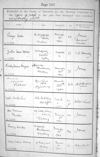GEORGE WILLIS
FATAL TRENCH ACCIDENT
CRUSHED BY A PIECE OF CLAY
Inquest at Newbury
Mr. E.V. Pinniger, the Newbury Borough Coroner, enquired late into an extraordinary fatal accident on a building site on Sunday. George Willis, a man aged 59, was standing in a trench only 5ft deep by 2ft 6in wide, when a piece of clay slipped away from the side of trench and pinned him to the other side. He was taken to Newbury Hospital, where he died directly, after admission. The clay, which weighed just over a hundredweight, had crushed his ribs, causing severe damage to his lungs. This was the cause of death.
Willis, who was a married man wife a wife and four children, lived at 50 Kingsbridge-road. He was a builder's labourer, and at the time was working for Messrs Cooke Bros., contractors.
At the inquest which was held at Newbury Police Court on Tuesday afternoon, Mr. J.T. Louch, solicitor, appeared for Messrs Cooke Bros., whilst a son of the deceased man, in R.A.F. Uniform, was also present.
Joseph Burton Tarrant, a foreman bricklayer for Messrs Cooke Bros., said he had known the deceased for 40 years and had worked with him on building sites on may occasions. About three o'clock on Sunday afternoon, deceased was in a trench on a building site near Newbury, assisting with levelling operations. He was holding a levelling staff, when a piece of clay slipped from the side and pinned him against the other wall of the trench. Witness said he assisted to free him. Mr. Louch; About how big was the piece of clay? - It probably weighed from one to one and a half hundredweight.
Could you give me any idea of its size? I should think it was about 2ft 6ins in depth and a foot in width. It was wedge shaped and tapered down to a point.
So its average thickness would not have been anything like a foot? - No, it was very thin at the bottom.
The trench was only about 2½ft in width? - It was 2ft 6ins. Wide and only five feet in depth.
The piece of earth would have had no distance to fall before it pinned the unfortunate man? - No, it didn't fall, but slipped upon him.
Was there anything to indicate to you as foreman that anything of the sort was likely to happen?
I have been foreman for the past 40 years and have never had anything of a similar occurrence before. The deceased had got into the trench to knock a peg in. He was not there more than five minutes and in another two minutes he would have been out of it.
As foreman, was there anything to indicate to you that there was anything of the sort was likely to happen? - It was a thousand to one chance.
There was nothing to indicate that there was any likelihood of any fall of clay or earth?-No, we have trenches far deeper than that and perfectly safe.
Mr. Cooke's Evidence
Arthur George Cooke, director of the firm of Messrs Cooke Bros. Ltd., building contractors, of Newbury, said he was at the site at the time. They were levelling in a peg. Deceased was assisting him. He was an experienced labourer and had frequently been in their employ. A mechanical excavator had just started on a drainage trench, which at the time of the accident was about five feet deep, eight feet in length and two feet six inches wide. The deceased was in the trench assisted with the levelling, when suddenly, without warning, a piece of clay slipped from the side of the trench upon him, pinning him against the wall. Witness obtained a piece of timber with which to lever the clay away. His foreman assisted the deceased up a ladder out of the trench. He was taken on a stretcher to the office, and whilst this was being done, an ambulance and doctor were sent for, and he was removed to the Newbury District Hospital. The soil was clay and the sides of the trench appeared to be sound. The excavator was not working whilst the deceased was in the trench. Mr. Cooke said he would not have hesitated to go into the trench himself had there been any need for him to do so. The excavator was not on the side of the trench where the accident happened, as it had only just started. Mr. Cooke said in his opinion it was not necessary to shore up the sides of a trench of that size and in that soil.
Mr. Louch said that the Borough Surveyor, Mr. Hutton, who had inspected the trench after the accident, was present in Court and would give evidence as to the trench if the Coroner wished.
The Coroner indicated that he would hear him.
Edward Howell Hutton, Borough Surveyor for Newbury, was then called. He said he inspected the trench the morning after the accident. Having regard to the width of the trench he was most surprised that a piece of clay had broken away and had been responsible for a fatal accident. In his opinion there was no need to take any special precautions such as shoring or timbering.
Dr. H. Warburton Lewis said that he was informed of the accident about 3.15 p.m. And at once went to the site. When he arrived, the man was just leaving in the ambulance for the hospital. He followed him there. He found the deceased suffering from badly crushed ribs. He died almost immediately. The cause of death was lung damage, due to fractured ribs.
The Coroner returned a verdict of Accidental death, and expressed his sympathy with the wife and family of the deceased. Mr. Louch on behalf of Messrs. Cooke Bros., associated himself with this.
Newbury Weekly News 12 November 1942
Mrs P. p 58
Ch 15
BMD Births
Newbury 2c 238 Sept Q 1883



